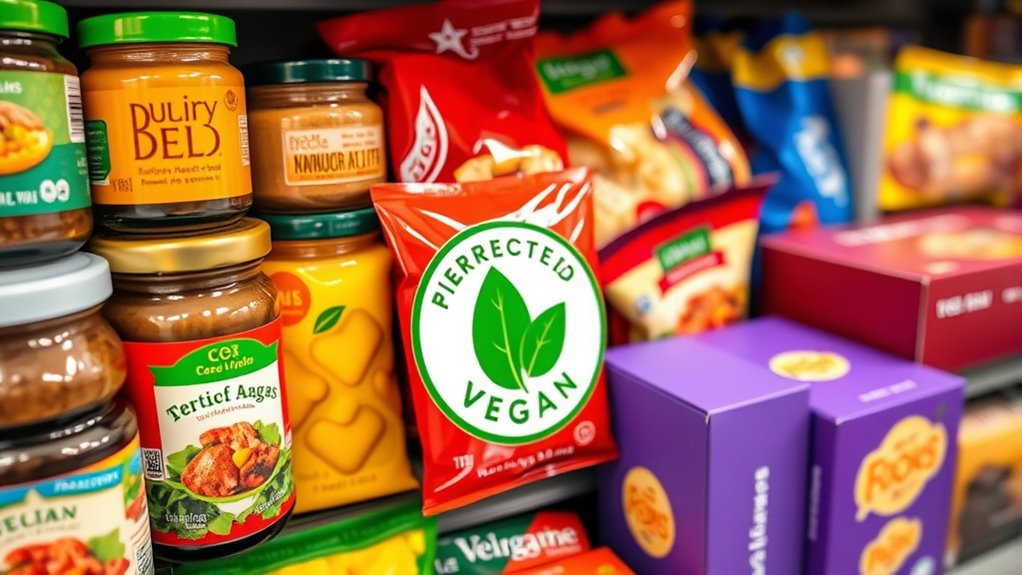When you see “certified vegan,” it means a trusted independent organization has verified the product contains no animal ingredients, by-products, or testing. Look for recognizable certification marks like the Vegan Trademark or Vegan Action. These labels guarantee the product meets strict standards and confirm it aligns with vegan principles. To confidently shop vegan, focus on ingredient transparency and reputable certifications—there’s more to uncover if you explore further.
Key Takeaways
- “Certified Vegan” means an independent organization has verified the product contains no animal ingredients or testing.
- Certification marks like Vegan Society or Vegan Action ensure compliance with strict vegan standards.
- These labels confirm the absence of animal-derived ingredients and animal testing throughout production.
- Not all vegan labels are trustworthy; certified marks provide transparency and reliability.
- Always check ingredient lists and certification symbols to confidently identify genuinely vegan products.

When shopping for vegan products, understanding labels can feel overwhelming, but knowing how to decode them makes the process much simpler. One key aspect is ingredient transparency. The best vegan products clearly list all ingredients, so you can verify that nothing animal-derived sneaks in unnoticed. Look for labels that specify plant-based ingredients and avoid vague terms like “natural flavors” or “emulsifiers” unless they’re clarified as vegan. Transparent ingredient lists give you confidence that the product aligns with your ethical and dietary choices, reducing the risk of accidentally consuming animal products.
Another essential factor is certification standards. The term “certified vegan” isn’t just a marketing gimmick—it signifies that a product has undergone a rigorous verification process by an independent organization. Certifications like the Vegan Society’s Vegan Trademark or the Vegan Action certification set strict guidelines that products must meet to earn their label. These standards ensure that no animal ingredients, by-products, or derivatives are used, and that animal testing is avoided throughout production. When you see a certified vegan label, you can trust that the product has been thoroughly vetted and adheres to recognized vegan principles.
Understanding these certification standards helps you distinguish genuine vegan products from those that simply market themselves as vegan without substantiation. Some brands might use vague language or misleading claims, but a certified label provides a clear, trustworthy indicator of compliance. It’s important to remember that not all vegan labels are created equal—look for well-known, reputable certification marks to guarantee consistency and reliability. Also, familiarize yourself with the certifying organization’s standards, so you know exactly what their certification entails.
In addition to ingredient transparency and certification standards, pay attention to the packaging and company practices. Ethical brands often go beyond just labeling; they emphasize sustainable sourcing and cruelty-free testing. However, the label remains your primary guide. When you focus on these key elements—clear ingredient lists and certified vegan marks—you gain the confidence to make informed choices that align with your values. This not only helps you avoid animal products but also supports brands committed to transparency and ethical standards in their manufacturing processes. Ultimately, decoding vegan labels empowers you to shop smarter, ensuring that every purchase truly reflects your vegan lifestyle.
Frequently Asked Questions
Does “Certified Vegan” Guarantee the Product Is Cruelty-Free?
No, “certified vegan” doesn’t guarantee the product is cruelty-free. It mainly means the product contains no animal ingredients and adheres to vegan standards. However, cruelty-free focuses on animal testing, so a product can be vegan but still involve animal testing. To verify ethical sourcing and cruelty-free practices, look for additional labels or certifications that specifically address animal testing and ethical sourcing practices.
Are All Vegan Certifications Universally Recognized?
Not all vegan certifications are universally recognized. Certification processes vary by organization, affecting label authenticity. You should check which certifying bodies are reputable and widely accepted, especially if you want assurance that a product truly meets vegan standards. Recognized certifications often have strict guidelines, giving you confidence in the label’s legitimacy. When shopping, look for well-known vegan logos to ensure the product aligns with your ethical and dietary preferences.
Can Vegan Labels Appear on Non-Food Items?
Yes, vegan labels can appear on non-food items, including cosmetic products. When you see a vegan label on these products, it indicates they contain no animal-derived ingredients and aren’t tested on animals. This helps you select cruelty-free options for skincare, makeup, and other personal care items. Always verify for certified vegan labels to confirm the product genuinely meets vegan standards, especially on non-food items where labeling can vary.
How Often Are Vegan Certifications Reviewed or Renewed?
Like updating your smartphone, vegan certifications need regular checks to stay valid. The certification process varies, but typically, renewal frequency occurs annually or every couple of years. You’re responsible for staying informed because certifying bodies review labels to verify compliance. This process guarantees that products labeled vegan truly meet standards, helping you make ethical choices. Keep an eye on renewal dates to avoid outdated labels, like missing the latest app update.
Do Vegan Certifications Consider Environmental Impact?
Vegan certifications primarily focus on ingredient and production practices, but some do consider environmental impact through sustainability certifications. When you see labels with environmental claims, they often align with these certifications, indicating efforts toward eco-friendly practices. However, not all vegan labels guarantee sustainability. It’s essential to check if the certification includes environmental criteria, so you can confidently support brands that prioritize both vegan principles and environmental responsibility.
Conclusion
So, next time you see that “certified vegan” label, remember it’s more than just a pretty badge. It’s a gentle whisper that the product aligns with your values, offering peace of mind on your journey. While labels can be a helpful guide, trusting your instincts and doing a little digging can lead to even more satisfying choices. After all, the best decisions are those made with clarity and confidence—your conscience will thank you.










